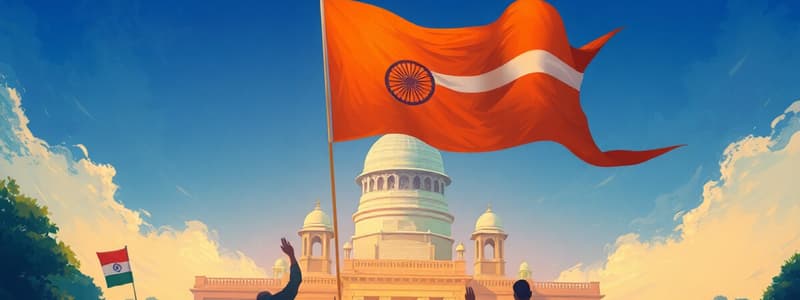Podcast
Questions and Answers
What is one major challenge to the democratic process in India?
What is one major challenge to the democratic process in India?
- Technological Advancement
- Gender Inequality (correct)
- Economic Stability
- Globalization
Which of the following best describes 'One Party Dominance' in the Indian party system?
Which of the following best describes 'One Party Dominance' in the Indian party system?
- A political scenario favored by the electorate
- Frequent changes in ruling parties due to coalitions
- A single party consistently winning elections over others (correct)
- A situation where multiple parties share equal power
Which factor contributes to regionalism as a challenge to democracy in India?
Which factor contributes to regionalism as a challenge to democracy in India?
- Interstate Political Rivalries (correct)
- National Economic Policies
- Local Governance Failures
- Cultural Homogeneity
What is one of the common types of party systems observed in India?
What is one of the common types of party systems observed in India?
Which of the following issues does NOT typically challenge the democratic process in India?
Which of the following issues does NOT typically challenge the democratic process in India?
Flashcards are hidden until you start studying
Study Notes
Democracy in India
- Democracy: A system of government where supreme power is vested in the people and exercised by them directly or indirectly through a system of representation usually involving periodically held free elections.
- Types of Democracy: Direct democracy, where citizens directly participate in decision-making, and Representative democracy, where citizens elect representatives to make decisions on their behalf.
- Features of Democracy: Free and fair elections, rule of law, separation of powers, an independent judiciary, respect for human rights, and a vibrant civil society.
- Challenges to Democratic Process in India:
- Inequality: Socioeconomic disparities, including wealth, income, and access to resources, can undermine democratic principles and participation.
- Illiteracy: Lack of education limits citizens' understanding of their rights and responsibilities, hindering their active participation in democratic processes.
- Regionalism: Regional identities and interests can sometimes lead to conflicts and tensions, posing challenges to national unity and cohesion.
- Naxalite Problem: The Naxal movement, characterized by armed rebellion against the state in certain regions, threatens the stability of democratic institutions and infrastructure.
- Gender Inequality: Gender disparities in social, economic, and political spheres limit the participation of women in democratic processes and hinder their access to equal opportunities.
Party System in India
- Party System: A system of political organization where political parties compete for power and influence.
- Types of Party Systems: One-party system, where only one party is permitted to hold power, Two-party system, where two dominant parties compete for power, and Multi-party system, where multiple parties compete for power.
- One-Party Dominance: A political system where one party holds a majority of seats in parliament and effectively controls the government. India experienced One-Party Dominance during the Congress Party's rule for a substantial period.
- Coalition Politics: A political system where two or more parties form an alliance to form a government. India has witnessed a rise in coalition politics since the mid-1990s, with no single party able to secure a majority on its own.
- Regional Parties: Political parties that primarily operate in specific geographical regions of India. These parties often focus on regional issues and concerns and play a crucial role in shaping the national political landscape.
Studying That Suits You
Use AI to generate personalized quizzes and flashcards to suit your learning preferences.




